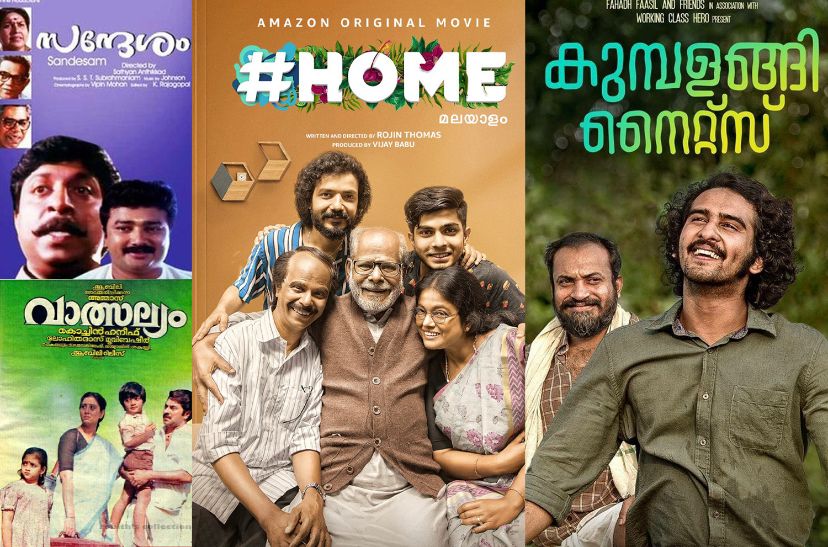Iranian-American actor Shohreh Aghdashloo once said, “Cinema is a reflection of its own society,” and Malayalam films have time and again proved this with their rooted and realistic stories. Family dynamics is among the topics that Malayalam cinema touches upon sensitively.
Unlike Hindi and Telugu film industries, which mostly focus on producing big-budget films and masala entertainers, Malayalam cinema is known for exploring micro-level concepts, like interpersonal relationships, in a pragmatic way. And it does this in films belonging to various genres as well.
The latest example of this is Bhoothakaalam. Falling under the horror genre, the film juxtaposes the haunted house trope with the disturbed minds of a mother (Revathi) and son (Shane Nigam). It also discusses how past trauma affects the duo, leading to strained relationships, depression and financial struggles. As director Rahul Sadasivan told Silverscreen India ahead of its release, the story follows the mother and son’s emotional journey, how they cope with certain situations, the change in power dynamics at home, and much more.
On that note, here is a list of films over time that have portrayed distinct family setups and relationships with that unique sensibility of Malayalam cinema.
Sandesham (1991)
Written by Sreenivasan and directed by Sathyan Anthikad, Sandesham is a classic in Malayalam cinema. The story follows two brothers, who are supporters of two rival political parties in Kerala. Elder brother Prabhakaran (Sreenivasan) is a loyal leftist, while the younger brother Prakashan (Jayaram) supports the ruling party governed by the Congress ideology. A rivalry brews over political differences between the two, leading to unending tiffs and friction in the home space and causing their parents distress over the brothers’ lack of concern for their personal life and the family.
Valsalyam (1993)
This film’s title means ‘parental love.’ Written by AK Lohitadas and directed by Cochin Haneefa, the film revolves around two brothers, Raghavan (Mammootty) and Vijakumar (Siddique). After the demise of their father, Raghavan takes up the responsibility of his younger brother Vijayakumar, to ensure he receives good care and proper education. However, over the course of time, the brothers’ relationship is strained, owing to a difference of opinions and change in mindsets. Further, their connection deteriorates as Raghavan loses his control over the family, denoting a change in power dynamics. The conflict aggravates after Vijaykumar marries a woman from an elite background, who finds their family simple and non-progressive.
Achuvinte Amma (2005)
This National award-winning film directed by Sathyan Anthikad is the story of a single mother Vanaja (Urvashi) and daughter Achu (Meera Jasmine). The jovial mother-daughter duo have a strong, healthy relationship, and share all their secrets with each other. Conflict arises, when Vanaja opposes Achu’s relationship with a man, creating a rift between the two. Achu’s questions about her father’s whereabouts adds to the distance between them. Following an unprecedented event, the mother is forced to reveal the secret of a lifetime.
Kumbalangi Nights (2019)
This film delves into the story of a dysfunctional family consisting of four brothers abandoned by their mother, who embarks on a religious mission after the demise of their father. Written by Syam Pushkaran and directed by Madhu C Narayanan, Kumbalangi Nights is considered to be part of new generation Malayalam cinema with its progressive ideas. It subtly exposes society’s judgement on unconventional familial setups, patriarchal mindsets, and male chauvinistic behaviours in seemingly ‘perfect family’ environments.
In her review, Aswathy Gopalakrishnan of Silverscreen India notes that the narrative is “built up of the inner turmoil of the characters” and “proceeds like a game of jigsaw puzzle where pieces are put together one by one to reveal the characters and their milieu in their completeness.”
Paapam Cheyyathavar Kalleriyatte (2020)
The title of this film translates to ‘Those that have not sinned, may cast stones’. The film revolves around an arranged marriage between two youngsters from elite Christian families. It offers a satirical take on the hypocrisy in moral codes and societal conditioning. The film also highlights issues like dowry, infidelity, disloyalty, and complicated past connections.
In Silverscreen India’s review, Aswathy says, “Over the course of the film, Purushothaman [director] brings the characters down the stage, to face the hard truths they’d been ducking. Many skeletons jump out of the closets of the two families. Embarrassing secrets and financial distress that had been long swept under the carpet come out in the open. Old flames reunite. Masks fall off the faces to reveal the ugliness and hypocrisy underneath.”
#Home (2021)
Recommended
Starring Indrans, Sreenath Bhasi, Naslen and Manju Pillai in prominent roles, this 2021 film looks into the generational gap between parents and their children, its impact on relationships, the alienation of elders who are unable to cope with today’s tech-savvy world, and much more.
This thought-provoking family drama is about a humble but technologically-challenged old man, Oliver (Indrans), who constantly strives to remain close with his two sons, who are obsessed with social media. On the other hand, the mother (Manju Pillai) is occupied with unending domestic chores and barely receives any appreciation.
In conversation with Silverscreen India, director Rojin Thomas revealed that he got the idea for the film following an incident at his own home. “My father asked me to teach him to recharge his phone. Earlier, we could only do it via the desktop. When I taught him the procedure, he took notes in his diary. Later, when he did it all by himself, the joy on his face was something I’ll never forget. That moment was the spark for this story.”



